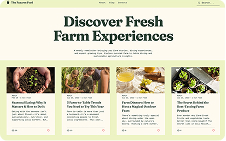- Aug 3, 2022
- 5 min read
Updated: Feb 28, 2024

When Lindy Alexander left her full-time job to give freelancing a try, she gave herself one year to make it work. In her first 11 months of freelancing, she made $100,000. Seven years later, she is an award-winning travel writer with an expansive portfolio on her business website, a steady stream of assignments and a six-figure income. On top of that, she runs her own online business, The Freelancer’s Year. What started as a career advice blog for other freelancers (across many types of businesses) has expanded to include a newsletter, courses, and private coaching.
When I first started freelancing, I knew nothing about how to start a business or how to create a freelance website. Lindy’s course put me on the right track. Although she primarily works with writers, her strategies are applicable to all sorts of freelancers and digital nomads. So, I sat down with her to learn more about the secrets to her success and how you can use them to make it big.
Wix: You made $100,000 in the first 11 months of freelancing, which is wildly impressive. What was your plan for your transition to freelance work?
Lindy Alexander: My passion was in feature writing, but I didn't feel like I would earn the bulk of my money that way. I decided to get into content marketing. So, I zhuzhed up my LinkedIn profile and reached out to people I had written for before. I leveraged my health writing experience and asked health organizations if they needed a freelance writer. I sent out letters of introduction to everyone.
Did you dip your toe into freelance writing while you were working full time, or did you just jump right in?
It started as a side hustle. I took a feature writing course and published an article by the time it ended. I just kept pitching, getting gigs and writing articles. Eventually, editors started to come to me with assignments. Suddenly, my desire to be a social worker diminished. I started focusing on freelancing [and hit a] point when I wondered if I could sustain an income as a full-time freelancer.
I was thrilled when people started paying me to write. But when I started doing it full-time, I had to look at it from a business perspective. I looked at all the work I had done over the previous 18 months and thought, “I can't spend six hours on an article that pays me $120 unless it’s a passion project.” I focused on getting work that would bring in the bulk of my income.
The freelance path is so unpredictable. It’s either drizzling or pouring. How do you manage the flow of your business?
I think those feast or famine times come from insecurity. A lot of freelancers don’t feel confident that they can charge what they want, say no to assignments, or push timelines back. Clients often hire freelancers with the perspective that it’s an emergency and we absorb that. I’m much better now at remembering that their emergency is not mine. Holding those boundaries is so difficult, but so important. This is my business, and I need it to work for me.

What other factors do you think would make freelancers’ lives easier?
Consistency. Freelancers come to me and say, “I’m not getting any traction with these letters of introduction.” But when I talk to them about it, they’ve only done it for a week or so. It’s a numbers game, so you need to keep putting yourself out there.
Having a long-term view is really important. When freelancers are busy, they think, “I cannot possibly take on anything else.” But when things are quiet, the vehicle has totally stopped. It takes a while to get those wheels turning again, and people panic.
You don’t have to be in full acceleration mode [all the time]. Just stay in touch and people will come back to you. I kept in touch with an editor over the last four years and never worked for him. But he called me last week with work. Some connections pay off quickly, but others take years to germinate.
Many freelancers get anxious about quoting or negotiating rates. How do you navigate that conversation?
An internal hourly rate makes it easier. Have an income target each month and each week. You need to know how many hours you want to work and how much you want to earn for each hour.
Track your hours so you know how long it takes you to write a 600-word blog post or a 12,000-word white paper. You’re not just pulling out a number. You know exactly what works for you. If they don’t accept it, you can move on and pursue other opportunities.
When do you forgo the high-paying jobs for passion projects?
Usually, it’s travel or food writing. Next month, I’m going overseas for 10 days. I won’t get paid very much, but I’m going to have incredible opportunities that I wouldn’t otherwise have. I just have to [plan to] have enough work to carry me through.
I just had an editor [reach out with] 10 stories to assign. I told her I could only take on two, but I could help find other writers.
It comes back to that confidence piece. I’m much better at saying to editors, “I can’t take this on,” or “I’m away, but I could take this on next month.”

How do you manage the stuff like networking and blogging that doesn’t make money?
For me, I work out how many actual hours of writing work I do a week [and base my rates on that]. When people want to make $100K per year, that is $8,333 a month, $400 per weekday. But you’re not working eight hours a day for 52 weeks. You have to give yourself breaks. And at least 30% of my time goes to bookkeeping, researching, pitching and blogging.
It’s really about planning and keeping control of your time. It’s not sexy, but it makes everything so much easier.
You’ve stayed in freelance for 11 years at this point. What makes the hard work worthwhile?
If you have a salaried position, you have a cap on what you can earn (see how to start a service business). I’m not particularly money-motivated, but I can see the direct correlation between the [freelance] work I do and the amount I get paid.
I love the flexibility, freedom and variation of freelance. I’ve written about parenting, health, business and education. Now, I’m in travel writing. There are so many opportunities to pursue what you love and to meet interesting people.
This interview has been edited for length and clarity.















